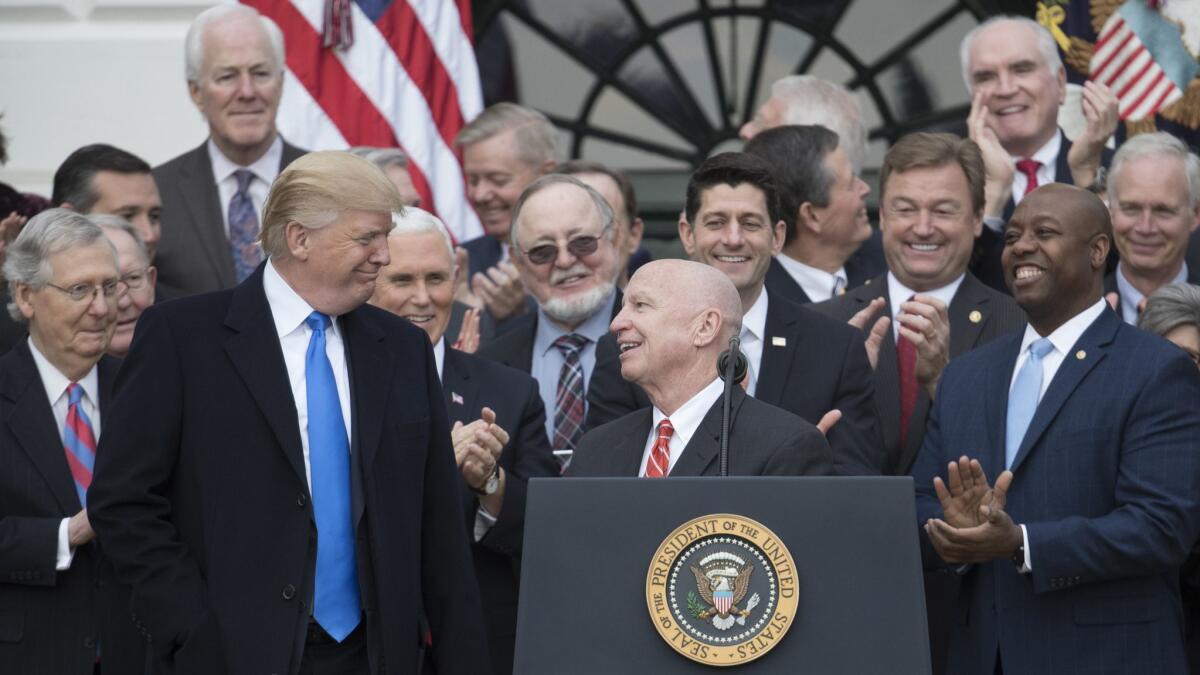House votes to make individual tax cuts and cap on state and local tax deductions permanent

The House voted Friday to make permanent the temporary individual tax cuts that took effect in January, a move that also locks in a new limit on state and local tax deductions that hits many residents hard in California and several other Democratic states.
But despite the 220-191 vote, largely along party lines, the Senate is unlikely to pass it because of solid Democratic opposition there.
House Republican leaders pushed for the vote anyway in the weeks before the November elections in hopes of forcing Democrats to vote against permanently extending the temporary tax cuts for individuals and so-called pass-through businesses that took effect Jan. 1.
Three Democrats joined with most Republicans in voting for the bill.
But the vote was difficult for Republicans in California, New York, New Jersey and other high-tax states where the new $10,000 limit on state and local tax deductions will cause tax bills to rise for many middle-income families.
Ten Republicans from high-tax states joined all the other Democrats in voting against the legislation.
The only Californian was Rep. Dana Rohrabacher (R-Costa Mesa), who is in a tough reelection fight and was among a dozen House Republicans nationwide who opposed last year’s tax bill because of the state and local tax deduction limit. The other Republicans who voted against the bill Friday were from New York and New Jersey.
House Republican supporters of the bill said the tax cuts have led to a booming economy. They noted that economic growth hit 4.2% in the second quarter of the year, the best since 2014, although analysts expect slower growth the rest of the year.
“Something is working out there in our society when you see more jobs than workers,” Rep. David Schweikert (R-Ariz.) said during debate before Friday’s vote. “There’s good things happening…. Could we at least have a little sound of joy for what is working?”
But Democrats, who uniformly opposed last year’s tax bill, said the new legislation would add to the skyrocketing federal budget deficit and warned that Republicans would use that as an excuse to cut Medicare and Social Security benefits.
House Democratic Leader Nancy Pelosi (D-San Francisco) derided the bill as a “warmed-over stew of trickle-down economics.”
Rep. Bill Pascrell (D-N.J.) complained that the cap on state and local tax deductions was unfair to his constituents. The average such deduction in his district was $18,000 in 2016, he said.
“Every member who votes for this monstrosity today is voting to make the [state and local tax deduction] caps forever and to impose a permanent tax on middle-class families,” he said.
The across-the-board cuts, including lowering the top marginal tax rate to 37% from 39.6%, and a new $10,000 cap on state and local tax deductions, are set to expire after 2025.
Republicans last year had to let the changes to the individual side of the tax code expire in order to permanently slash corporate tax rates — to 21% from 35% — without violating a legislative commitment that the bill would not add more than $1.5 trillion to the federal budget deficit over 10 years.
The Congressional Budget Office this summer increased that estimate to $2.3 trillion because rising interest rates will add to the cost of financing the deficit.
No House or Senate Democrats voted for last year’s bill. One of their complaints was that the individual tax cuts were temporary while corporate tax cuts were permanent.
Republicans said the new legislation fixes that problem. But despite passing the House on Friday, it’s unlikely to even get a vote in the Senate.
Last year’s tax bill was able to pass the Republican-controlled Senate with a simple majority vote using an arcane process called budget reconciliation. That mechanism is not available to the Republicans this fall, meaning they’d need 60 votes — and the support of nine Democrats — to pass this time.
But making the individual tax cuts permanent would increase the federal budget deficit by an additional $631 billion over the next decade, according to Congress’ nonpartisan Joint Committee on Taxation.
Twitter: @JimPuzzanghera
UPDATES:
9:55 a.m.: This article was updated with details about the vote.
This article originally was published at 9:35 a.m.
More to Read
Inside the business of entertainment
The Wide Shot brings you news, analysis and insights on everything from streaming wars to production — and what it all means for the future.
You may occasionally receive promotional content from the Los Angeles Times.











